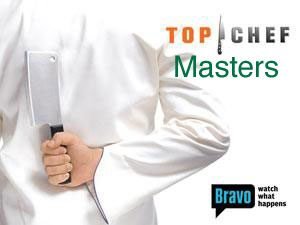Acquiring a Taste for "Top Chef Masters" (or, Corn Dogs as Metaphors)
[Hey, this is Adam The Amateur Gourmet. I'm on vacation in Barcelona, Spain and while I'm gone I've asked some awesome people to fill in for me. This post comes from one of the smartest people I know, a master of the written word and lover of pop culture, Mr. Mark Blankenship. Mark's blog, The Critical Condition, is a playful, thoughtful, and insightful look at all things pop. When he's not blogging, Mark writes features in the arts section of The New York Times. Take it away, Mark!]
Thanks to Adam for having me back. It's a pleasure to be here!
So... let me acknowledge this up front: "Top Chef Masters" will never be "Top Chef." Kelly Choi lacks that Padma Pizzazz, and though strangely-hatted food critic Gael Greene could have her own show, her fellow judges Jay Rayner and James Oseland are just... icky. Do you know what I mean? They're perceptive and articulate, sure, but they seem so satisfied with themselves. It's like, dude: The joke you made about the pig's ear wasn't funny, so stop chuckling about it. I've written that OTC (Original "Top Chef") takes itself too seriously, but watching those smug smuggers strain to be lighthearted is even more irritating.
That said...
When I tilt my head the right way, I can see that "Top Chef Masters" is bringing something unique to the Bravo Reality universe.
For instance, can you think of another competitive reality series, and especially one on Bravo, that's so disinterested in conflict? The chef-testants hug and laugh and weep about the charities they're playing for. The judges generally praise the food, and when they don't like something, they don't freak out: They express their opinions and then move politely to the better parts of the meal they've been served.
What's more, the masters don't even get scolded when they screw up. If an OTC contestant didn't serve anything during a quickfire challenge---the way Rick Moonen didn't finish his dish during the "junk food" face off---then she would be raked over coals, thrown under buses, and told she wasn't there to make friends. There would be a testimonial of her crying, then a segment of her competitors talking nasty smack, then a shot of Tom Colicchio barking that in "the real world," no food means no career.
But on "TCM?" Rick Moonen beat himself up a little, Kelly Choi made a half-scolding face, and everyone moved on.
And really, what would be the point of bringing the pain? "Top Chef Masters" doesn't need high drama because it has nothing at stake. No matter which corn dog they forget to plate, the chefs will still have successful restaurants, and even if they come in dead last, they'll still get a check for their charities.
So what do you get without the life-and-death, my-career-depends-on-this hysterics that spur "Top Chef" and "Shear Genius" and all the rest?
For one thing, you get the master chefs' confidence. Since they know they can't really "lose," and since they know they've already proven themselves in the much-ballyhooed "real world," they seem less intimidated by risk and less flustered by mistakes. It wasn't "dramatic," for instance, but when Anita Lo created her "illusion scallops" in the Neil Patrick Harris episode, she conveyed a sense of real discovery and joy. We saw how a confident artist can embrace the chance to try something new. Conversely, when Douglas Rodriguez set a coconut on fire in the same episode, with dismal results, he breezily chalked it up as a lesson learned.
That may be less gripping than a high-stakes "Top Chef" challenge, but in the long run, it's probably more useful. It's good to remember that trying something new can be a source of joy, and not just a means of impressing some real or imagined panel of judges. Meanwhile, it's true that a big mistake is not the end of the world, especially if it teaches you something.
I know those happy homilies are tucked inside most reality shows, but "Top Chef Masters" is one of the few current series to focus itself around them. Instead of trumpeting what it takes to get ahead, it celebrates people who have already gotten there. Their mindset is relaxed and playful, not tense and fearful, and I feel like absorbing that attitude for a few months could help me through my daily routine. Because lord knows if I try to make corn dogs, something could go wrong, but I wouldn't have to see it as a failure. I could even be happy about attempting to make them in the first place.


